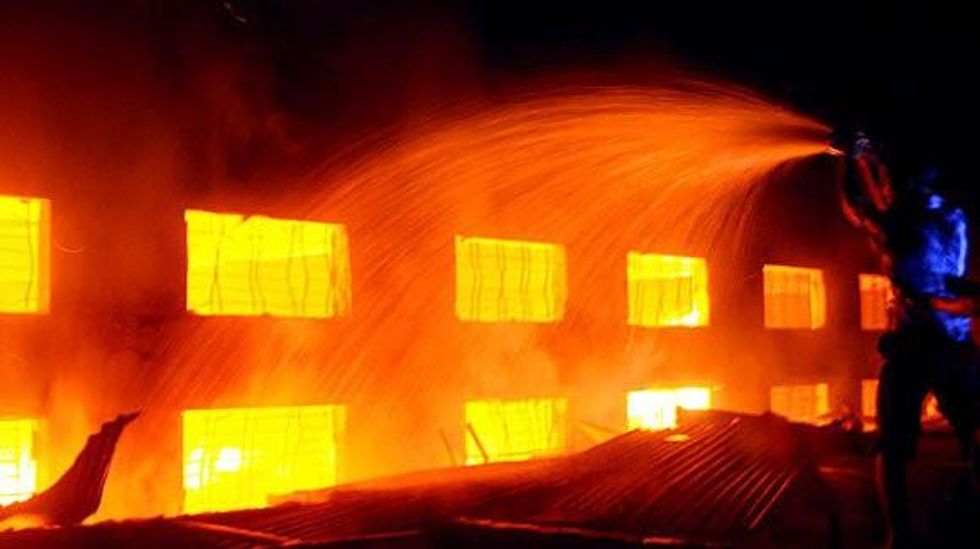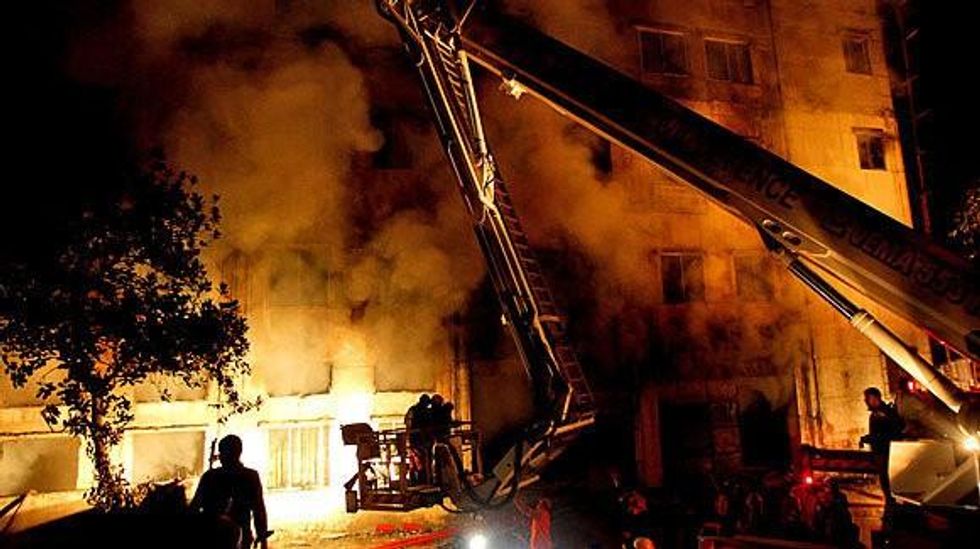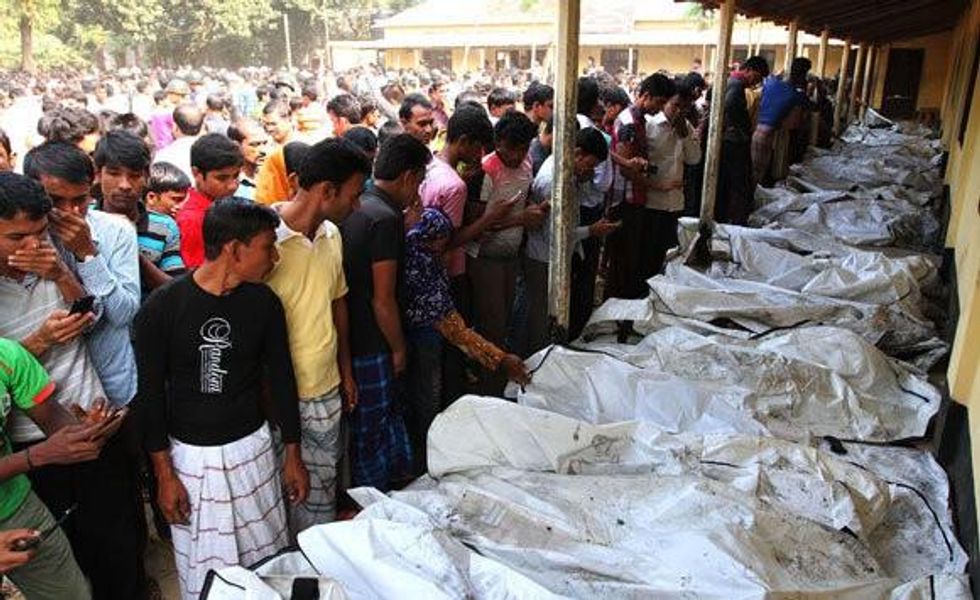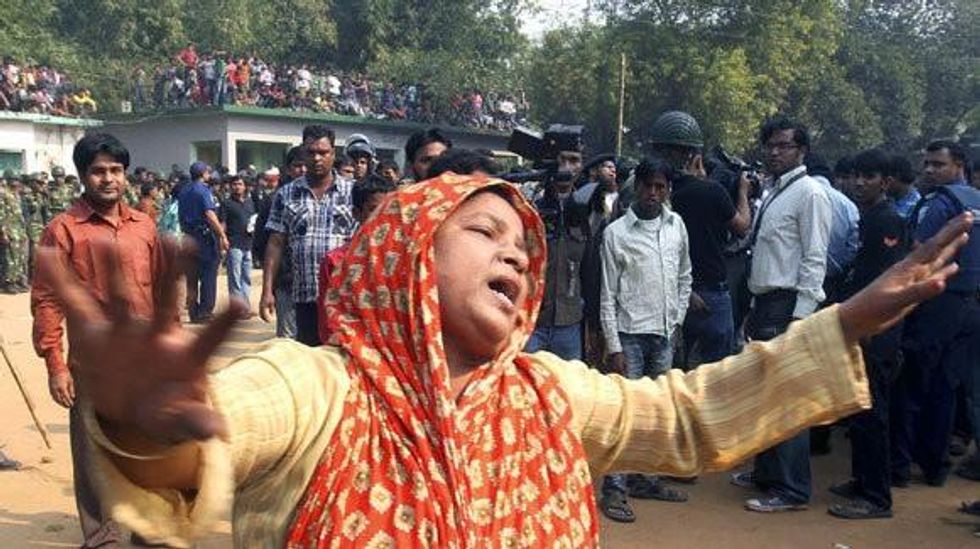

SUBSCRIBE TO OUR FREE NEWSLETTER
Daily news & progressive opinion—funded by the people, not the corporations—delivered straight to your inbox.
5
#000000
#FFFFFF
To donate by check, phone, or other method, see our More Ways to Give page.


Daily news & progressive opinion—funded by the people, not the corporations—delivered straight to your inbox.
A fire roared through a multi-story garment factory outside the capital city of Dhaka, Bangladesh on Saturday night, killing more than 110 people.
The garment industry in Bangladesh makes clothes for many familiar brands in the US--including Wal-Mart, JC Penney, H&M, The Gap, and others--but poor working conditions in the nation's factories are well known and a pattern of fires have killed hundreds in recent years.
Al-Jazeera reports:
The fire at the nine-story factory, operated by Tazreen Fashions in the Ashulia industrial area, started on the ground floor on Saturday night and quickly spread. Firefighters took nearly five hours to extinguish the flames.
Many of the employees fled the flames on the first floor and went to the top of the building, becoming trapped.
Most of the victims died because they jumped from the building to escape the flames, a police official said. The death toll could still rise, witnesses said.
Bangladesh--the world's second-largest garment exporter after China--is notorious for its systemic mistreatment of garment workers, with lax safety and fire codes, and has been a target of criticism by international anti-sweatshop campaigners for years.
As the New York Timesreports:
Since 2006, more than 500 Bangladeshi workers have died in garment factory fires, according to Clean Clothes Campaign, an anti-sweatshop advocacy group based in Amsterdam. Experts say many of the fires could have been easily avoided if the factories had taken the right precautions. Many factories are in cramped neighborhoods, have too few fire escapes and widely flout safety measures. The industry employs more than three million workers in Bangladesh, mostly women.
Activists say that global clothing brands need to take responsibility for working conditions in Bangladeshi factories that produce the clothes that they sell.
"These brands have known for years that many of the factories they choose to work with are death traps," Ineke Zeldenrust, the international coordinator for Clean Clothes Campaign, said in a statement. "Their failure to take action amounts to criminal negligence."
_______________________




_______________________
Political revenge. Mass deportations. Project 2025. Unfathomable corruption. Attacks on Social Security, Medicare, and Medicaid. Pardons for insurrectionists. An all-out assault on democracy. Republicans in Congress are scrambling to give Trump broad new powers to strip the tax-exempt status of any nonprofit he doesn’t like by declaring it a “terrorist-supporting organization.” Trump has already begun filing lawsuits against news outlets that criticize him. At Common Dreams, we won’t back down, but we must get ready for whatever Trump and his thugs throw at us. Our Year-End campaign is our most important fundraiser of the year. As a people-powered nonprofit news outlet, we cover issues the corporate media never will, but we can only continue with our readers’ support. By donating today, please help us fight the dangers of a second Trump presidency. |
A fire roared through a multi-story garment factory outside the capital city of Dhaka, Bangladesh on Saturday night, killing more than 110 people.
The garment industry in Bangladesh makes clothes for many familiar brands in the US--including Wal-Mart, JC Penney, H&M, The Gap, and others--but poor working conditions in the nation's factories are well known and a pattern of fires have killed hundreds in recent years.
Al-Jazeera reports:
The fire at the nine-story factory, operated by Tazreen Fashions in the Ashulia industrial area, started on the ground floor on Saturday night and quickly spread. Firefighters took nearly five hours to extinguish the flames.
Many of the employees fled the flames on the first floor and went to the top of the building, becoming trapped.
Most of the victims died because they jumped from the building to escape the flames, a police official said. The death toll could still rise, witnesses said.
Bangladesh--the world's second-largest garment exporter after China--is notorious for its systemic mistreatment of garment workers, with lax safety and fire codes, and has been a target of criticism by international anti-sweatshop campaigners for years.
As the New York Timesreports:
Since 2006, more than 500 Bangladeshi workers have died in garment factory fires, according to Clean Clothes Campaign, an anti-sweatshop advocacy group based in Amsterdam. Experts say many of the fires could have been easily avoided if the factories had taken the right precautions. Many factories are in cramped neighborhoods, have too few fire escapes and widely flout safety measures. The industry employs more than three million workers in Bangladesh, mostly women.
Activists say that global clothing brands need to take responsibility for working conditions in Bangladeshi factories that produce the clothes that they sell.
"These brands have known for years that many of the factories they choose to work with are death traps," Ineke Zeldenrust, the international coordinator for Clean Clothes Campaign, said in a statement. "Their failure to take action amounts to criminal negligence."
_______________________




_______________________
A fire roared through a multi-story garment factory outside the capital city of Dhaka, Bangladesh on Saturday night, killing more than 110 people.
The garment industry in Bangladesh makes clothes for many familiar brands in the US--including Wal-Mart, JC Penney, H&M, The Gap, and others--but poor working conditions in the nation's factories are well known and a pattern of fires have killed hundreds in recent years.
Al-Jazeera reports:
The fire at the nine-story factory, operated by Tazreen Fashions in the Ashulia industrial area, started on the ground floor on Saturday night and quickly spread. Firefighters took nearly five hours to extinguish the flames.
Many of the employees fled the flames on the first floor and went to the top of the building, becoming trapped.
Most of the victims died because they jumped from the building to escape the flames, a police official said. The death toll could still rise, witnesses said.
Bangladesh--the world's second-largest garment exporter after China--is notorious for its systemic mistreatment of garment workers, with lax safety and fire codes, and has been a target of criticism by international anti-sweatshop campaigners for years.
As the New York Timesreports:
Since 2006, more than 500 Bangladeshi workers have died in garment factory fires, according to Clean Clothes Campaign, an anti-sweatshop advocacy group based in Amsterdam. Experts say many of the fires could have been easily avoided if the factories had taken the right precautions. Many factories are in cramped neighborhoods, have too few fire escapes and widely flout safety measures. The industry employs more than three million workers in Bangladesh, mostly women.
Activists say that global clothing brands need to take responsibility for working conditions in Bangladeshi factories that produce the clothes that they sell.
"These brands have known for years that many of the factories they choose to work with are death traps," Ineke Zeldenrust, the international coordinator for Clean Clothes Campaign, said in a statement. "Their failure to take action amounts to criminal negligence."
_______________________




_______________________